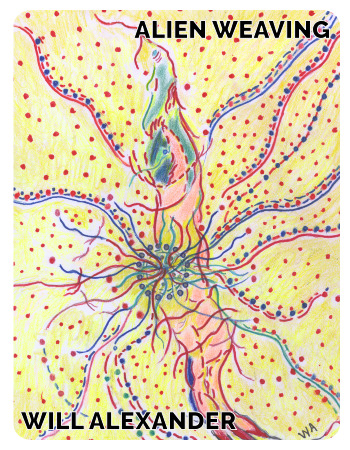 Alien Weaving, by Will Alexander
Alien Weaving, by Will Alexander
In the Allegory of the Cave, Plato writes about a man who has literally added an entire dimension to his thinking. The man’s eyes are opened to the world’s depth and complexity in a way that nearly blinds him twice. And when he tries to share his newfound knowledge with his friends, they reject him and it in favor of their comforting darkness. I cannot help but think of the Allegory of the Cave when I read Alien Weaving, by Will Alexander. The protagonist of the story, a woman named Kathrada, reads as if she is stepping into the glare of the sun, her skin and retinas searing but vehemently resisting destruction, as if through sheer determination she can transcend physical limitation. She goes on a psychological and metaphysical journey that somehow encompasses the entire planet and yet never truly leaves the confines of her cacophonous mind. The result of this transformative trial of endurance is that she becomes a prophet of perspective.
The first thing that takes hold of you as you read Alien Weaving is the language. From the first paragraph, the complexity and the intricacy of the word choice and sentence structure are of paramount importance. It could said that this is the case for any work of literature, regardless of quality, but the difference here is that Alexander is using every vocabulary tool the English language can provide to describe the sensations and thought processes that Kathrada experiences. It transcends pretention through sublime specificity, and it makes no apology for its quest to find the place where language and reason meet. In fact, the closest thing to an apology is a demand of the reader: “You must excuse the complexity of my aboriginal fulguration, of my feral-first seeing.” And, indeed, you must, if you have any hope of traversing the text. Make no mistake – this work is demanding, challenging, and complex. It is not for casual reading, winding down, or clearing the mind. Kathrada has had her mind opened to the hypercomplexity of the cosmos and its vast interconnectedness, and she has no reason to wait for those who lack curiosity. The words pour from her like light that simply cannot be contained by her physical vessel.
But for all of her intellectual apotheosis, Kathrada is still remarkably human, and that fact keeps Alien Weaving accessible and relatable through the myriad vistas and experiences. As so many revelations are, the concepts that she encounters and describes are alternately beautiful and horrifying. The aloof distance in the tone (made ironic by the use of the 1st person) buffers tragedies in a fashion reminiscent of Vonnegut – “When I renounced the Christ child as phasma I was no longer spared by believers, I was plunged into thickets of anathema, and then labeled as protectress of infernos.” The descriptive terms are vivid and poignant, but the many sentences like these are spoken of in remembrance, almost as if they had happened to someone else, a possibility that, given the transformation of the character, is philosophically justifiable. This distance cracks more than once, however, giving the reader critical insights – “I am an exile because of this fierce resistance I carry about me. I refuse to be a resident within the statutes of crime.” Lines like this are delivered with sudden venom and a flavor of defensiveness as if, even post-evolution, she still feels an instinctive impulsive to guard and justify herself. Moreover, the work’s repeated invocation of the concept of vertigo is very telling. Kathrada is overtaken by it more than once. As she slips in and out of the flow of time, across the wide expanses of nations, and between schools of thought, she seems to be able to sense the sheer distance she has traveled and can traveled. She finds it nauseating as often as any other descriptor. Whether her alchemical reshaping is, as of yet, incomplete, or she exists in some Christ-like duality of human and divine is left for the reader to decide.
Alien Weaving is an amazing text and something of a love letter to the act of writing. When Kathrada opens the text by stating “I create.”, she means that on multiple levels. She understands now that, as a writer dedicated to her craft and crafted by her experiences, she possesses the tools and capacity to shape reality itself. Moreover, she understands the responsibility that comes with such power, but she does not let it burden her. She weaves in spite of the wounds, allowing blood the mix into the tones, forsaking the pristine in favor of the real. Mr. Alexander has presented a masterclass in the use of language and the interconnectedness of emotion, thought, and existence. I would encourage anyone who dreams of being a writer to engage this text again and again, so that they might see what can be achieved through choice alone.
Alien Weaving is now available through Anonymous Energy.
